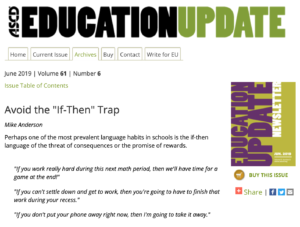Avoid the “If-Then” Trap
 We want students to be more than compliant, don’t we? In addition to doing the right things, we want them to do so for the right reasons. We want students to pick up trash to keep the room clean, to be kind to others because it makes them feel good, and to complete work on time to be responsible.
We want students to be more than compliant, don’t we? In addition to doing the right things, we want them to do so for the right reasons. We want students to pick up trash to keep the room clean, to be kind to others because it makes them feel good, and to complete work on time to be responsible.
Yet one of the most prevalent language habits in schools is the “if-then” language of the promise of rewards or the threat of consequences. We accidentally send low-level moral reasoning for doing good when we rely on “if-then” language. So what should we say instead?
In this article, published in June 2019 in Education Update, I offer some suggestions! Click on the link below to read the article.
Author
-
Mike Anderson has been an educator for many years. A public school teacher for 15 years, he has also taught preschool, coached swim teams, and taught university graduate level classes. He now works as a consultant providing professional learning for teachers throughout the US and beyond. In 2004, Mike was awarded a national Milken Educator Award, and in 2005 he was a finalist for NH Teacher of the Year. In 2020, he was awarded the Outstanding Educational Leader Award by NHASCD for his work as a consultant. A best-selling author, Mike has written ten books about great teaching and learning. His latest book is Rekindle Your Professional Fire: Powerful Habits for Becoming a More Well-Balanced Teacher. When not working, Mike can be found hanging with his family, tending his perennial gardens, and searching for new running routes around his home in Durham, NH.
You may also like

Finding Time for a One-on-One Problem-Solving Conference
- October 23, 2024
- by Mike Anderson
- in Blog



